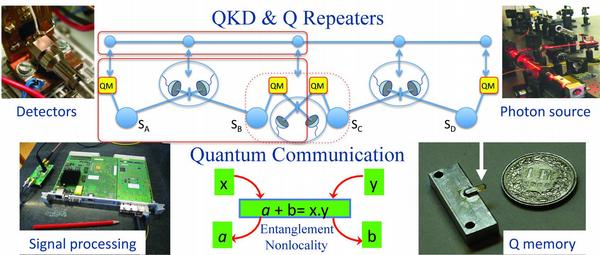3B: Quantum Repeaters
Quantum repeaters for Quantum Communications
PL: N. Gisin
Involved PIs: H. Bölcskei, M. Christandl, R. Renner, S. Wolf, H. Zbinden
Quantum Key Distribution (QKD) is the first commercial application of quantum physics at the level of individual quanta, together with Quantum Random Number Generators. Direct point-to-point quantum communication in standard telecom optical fibers is, however, ultimately limited to about 300-500 km due to losses in the fiber. Overcoming this limit is a grand challenge; it will require quantum repeaters, entanglement swapping, and multimode quantum memories. The latter, namely storing and retrieving single-photons on demand in quantum memories with long quantum coherence times, is the most challenging step in this endeavor. Our efforts are spread over both experiment and theory and reach from applied to fundamental aspects of QKD and quantum communication in general. The applied effort is focused on improving the overall system performance for direct-transmission QKD up to 300 km. At the same time, the goal of the more fundamental experimental effort will look to realize quantum memories, based on ensembles of rare-earth ions “frozen” in a crystal, and then to integrate these in a quantum repeater architecture.
The realization of quantum repeaters will require photon sources that are compatible with quantum memories and can be adapted for different protocols and architectures. We will investigate both photon pairs and single-photon sources. The final, and again more applied, ingredients are the various single-photon detectors that are necessary for both point-to-point and quantum repeater QKD architectures and here we will utilize and optimize both solid state and superconducting devices to exploit their specific characteristics.
On the theory side our goal is, first, to asses the security of practical QKD protocols, with and without quantum repeaters and, next, to exploit entanglement and non-locality for (otherwise impossible) information-processing tasks. From a more fundamental perspective, one of the most surprising phenomena of quantum physics is that the joint behavior under - possibly space-like separated - measurements is non-local, i.e., unexplainable by pre-shared classical information. We plan to improve our understanding of non-locality by studying it from the point of view of information and to pursue experimental tests of alternative models of quantum correlations.
